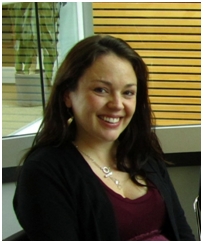 Q: Why did you decide to study at UBC?
Q: Why did you decide to study at UBC?
A: I decided to study at UBC because Brad and I were moving to Vancouver to be close to family. I had previously worked at the NZ Blood Service and was very interested in coagulation so when Cedric told me about the CBR it sounded like a good fit.
Q: Who was your supervisor and what was your research focus?
A: Ross MacGillivray was my supervisor and the focus of my research was investigation of the coagulation protease, thrombin. I was interested in making a better, more coagulant and stable thrombin.
Q: How many publications did you contribute to while in the LSI/CBR? What are they?
A: Whilst at the LSI/CBR I contributed to the following published articles:
Carter I.S.R, Vanden Hoek A.L, Pryzdial E.L.G, MacGillivray R.T.A. Thrombin A-chain: activation remnant or allosteric effector? Thrombosis. 2010; vol. 2010: 9 pages.
Carter I.S.R, Wong, A.Y, Bleakley, M.R, Vashchenko, G, Fox, H.D, MacGillivray, R.T.A. Molecular basis of human coagulopathies. In: Matsumoto A, Nakano, M., editor. The human genome: features, variations and genetic disorders. New York: Nova Science Publishers Inc.; 2009. p. 101-24.
Carter I.S.R, Hewitt J, Pu C.H, Wu J.K, Carter C.J, MacGillivray R.T.A. Severe protein S deficiency resulting from two novel mutations in PROS1 presenting with a relatively mild clinical phenotype. J Thromb Haemost. 2008 vol. 6(7): p. 1237-9.
With two more in submission now!
Q: What career options have you looked into?
A: After my PhD I was interested in pursuing a marketing role in the science/health field to utilize my previous career in marketing, whilst also keeping abreast of scientific advances. I am now employed as a marketing product manager for StemCell Technologies for hematology products.
Q: What words of advice do you have for current students? Potential students?
A: The advice I have for current students and potential students is:
- Choose a topic you are passionate about and invested in, as there will be many times when experiments run long into the night.
- I also suggest taking a project management course early in your PhD studies as this will help provide the tools you need to keep your project on track.
- Plan your thesis outline in the first year with thesis chapters based on potential publications, this will ensure you have a viable project with realistic goals that can be agreed upon with your supervisor. This process will also keep you focused on thesis and publication worthy research.
- NETWORK with other members of the CBR, LSI and your fellow program students. I was able to save lots of valuable time by asking for help with techniques and my approach from PIs, postdocs, technicians and other students. There is no reason to do it alone!
- Decide what your career goals are early in your studies, as you will have many opportunities to gain expertise in technical skills, writing, public speaking, mentoring etc and you need to know what might be valuable post PhD to employers.
- The CBR is full of smart, funny, kind and wonderful people and it is always more fun to work with a team than alone.
We thanks Isis for taking the time to answer some questions for us and wish her continued success in her new role at StemCell Technologies!



Comments are closed, but trackbacks and pingbacks are open.